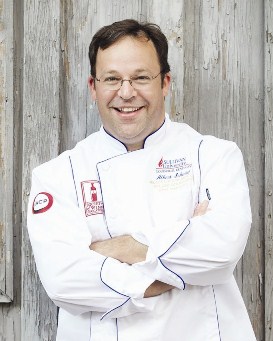The Importance & Mechanics of Beverage Education
30 April 2012
 Many students arrive for class thinking they don’t need to know about beverage because they deal with food. Here’s why they’re wrong.
Many students arrive for class thinking they don’t need to know about beverage because they deal with food. Here’s why they’re wrong.
By Albert W. A. Schmid, MA, CCP, CHE, CFBE, MCFE, CCE, CEC, COI
The message outlined in black letters on the white t-shirt is clear: Beer is Food! The first time I saw this t-shirt, I smiled, but beer does not hold a unique distinction among alcoholic beverages because wine and spirits are food, too.
In simple terms, beer is made from grain and wine is made from fruit. If a beer is distilled, it becomes either vodka or whiskey. If a wine is distilled it becomes a brandy (or sometimes vodka). There are other spirits that might be considered either depending on how you look at them, such as tequila from the agave plant, rum from sugar cane and vodka from potatoes. In any case, the alcohol starts with a food product, and we consume the final product as part of a meal or snack.
Wines, beers and spirits are used daily by chefs to prepare dishes for their customers. These beverage products are also paired with dishes to enhance the customer’s enjoyment of the food and the overall dining experience. Adding an alcoholic beverage to a meal elevates the experience to a celebration.
On the surface a student chef needs to understand alcoholic beverage because alcohol 1) is food, 2) pairs well with other food and 3) adds a celebratory quality to a meal. These three reasons alone make a great case for teaching students about alcoholic beverage, but perhaps the most important reason is how much money a restaurant or hotel makes off the sale of alcoholic beverage. If food drives revenue, then beverage drives profit.
Think about this statement for a minute. Most fast-food restaurants realize great profits in the beverage category. Starbucks is a company built with a primary focus on beverage sales. I was not surprised to hear that Starbucks was expanding to alcohol sales in certain markets. Starbucks now enjoys serving the same customers as they go to and from work. Some fast-food chains, such as Burger King and Sonic, are adding beer to their menu in some areas. Beer is served in fast-food establishments in Europe and has been for years.
I like to open my class asking what students know about alcohol and what experiences they have had with beverage. Many students will arrive for class with the misconception that they know a lot about beverage already or that they don’t need to know about beverage because they deal with food. Two of the most important concepts to impart to students are beverage is food and beverage is a very important profit center for their establishment. I like to hit these facts early because it allows the students to buy into the importance of beverage and gives them a good business reason to learn the subject.
The next step is to discuss what the student is familiar with and what he or she likes and dispel any myths he or she might have about beverage or alcohol in general, then build on his or her existing knowledge. An example of a myth is “Bourbon is only made in Kentucky.” While bourbon is made in Kentucky, this whiskey is not only made in Kentucky. Another myth might be, “Sparkling wine from France is known as Champagne.” Again, Champagne is the best known, but it is not the only sparkling wine from France.
A concept that must be stressed is safe consumption of alcohol. A part of this concept is the liability attached to alcohol. Like other food products, alcohol has liability related to the consumption by our guests. Just as if someone eats an undercooked piece of chicken or a tainted hamburger, we can be sued if someone over-consumes alcohol. If the offence is egregious, the liquor license can be revoked. This is a situation that we need to avoid at all costs.
Finally, build students’ knowledge in each of the subjects and stress good business principles including limiting legal liability. Enjoy teaching beverage management. Your enthusiasm for the subject will translate into well-prepared students for the marketplace. The knowledge that you impart will allow your students to increase their profits and increase their chances of success.
Albert W. A. Schmid, MA, CCP, CHE, CFBE, MCFE, CCE, CEC, COI, is a professor and chair, Hotel-Restaurant Management, Beverage Management and Hospitality Management Departments at Sullivan University’s National Center for Hospitality Studies in Louisville, Ky.
